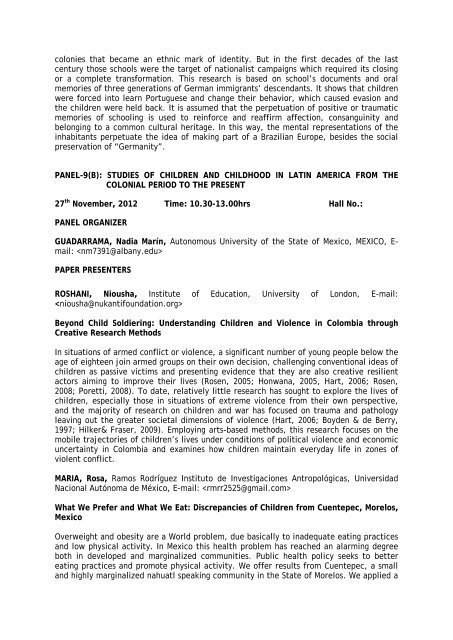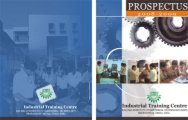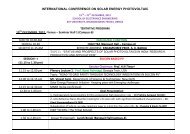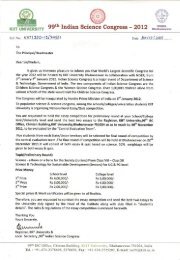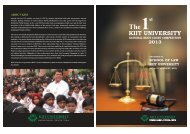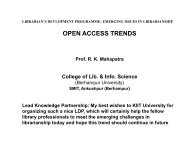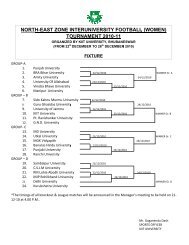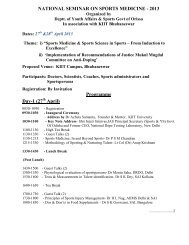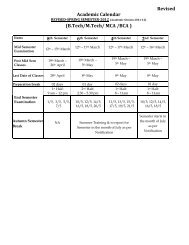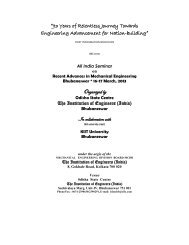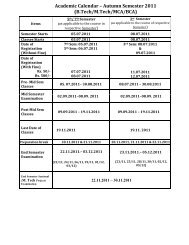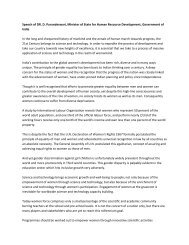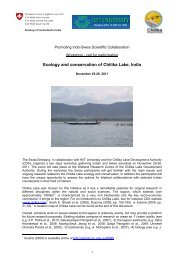PANEL ORGAN - KIIT University
PANEL ORGAN - KIIT University
PANEL ORGAN - KIIT University
Create successful ePaper yourself
Turn your PDF publications into a flip-book with our unique Google optimized e-Paper software.
colonies that became an ethnic mark of identity. But in the first decades of the last<br />
century those schools were the target of nationalist campaigns which required its closing<br />
or a complete transformation. This research is based on school’s documents and oral<br />
memories of three generations of German immigrants’ descendants. It shows that children<br />
were forced into learn Portuguese and change their behavior, which caused evasion and<br />
the children were held back. It is assumed that the perpetuation of positive or traumatic<br />
memories of schooling is used to reinforce and reaffirm affection, consanguinity and<br />
belonging to a common cultural heritage. In this way, the mental representations of the<br />
inhabitants perpetuate the idea of making part of a Brazilian Europe, besides the social<br />
preservation of “Germanity”.<br />
<strong>PANEL</strong>-9(B): STUDIES OF CHILDREN AND CHILDHOOD IN LATIN AMERICA FROM THE<br />
COLONIAL PERIOD TO THE PRESENT<br />
27 th November, 2012 Time: 10.30-13.00hrs Hall No.:<br />
<strong>PANEL</strong> <strong>ORGAN</strong>IZER<br />
GUADARRAMA, Nadia Marín, Autonomous <strong>University</strong> of the State of Mexico, MEXICO, E-<br />
mail: <br />
PAPER PRESENTERS<br />
ROSHANI, Niousha, Institute of Education, <strong>University</strong> of London, E-mail:<br />
<br />
Beyond Child Soldiering: Understanding Children and Violence in Colombia through<br />
Creative Research Methods<br />
In situations of armed conflict or violence, a significant number of young people below the<br />
age of eighteen join armed groups on their own decision, challenging conventional ideas of<br />
children as passive victims and presenting evidence that they are also creative resilient<br />
actors aiming to improve their lives (Rosen, 2005; Honwana, 2005, Hart, 2006; Rosen,<br />
2008; Poretti, 2008). To date, relatively little research has sought to explore the lives of<br />
children, especially those in situations of extreme violence from their own perspective,<br />
and the majority of research on children and war has focused on trauma and pathology<br />
leaving out the greater societal dimensions of violence (Hart, 2006; Boyden & de Berry,<br />
1997; Hilker& Fraser, 2009). Employing arts-based methods, this research focuses on the<br />
mobile trajectories of children’s lives under conditions of political violence and economic<br />
uncertainty in Colombia and examines how children maintain everyday life in zones of<br />
violent conflict.<br />
MARIA, Rosa, Ramos Rodríguez Instituto de Investigaciones Antropológicas, Universidad<br />
Nacional Autónoma de México, E-mail: <br />
What We Prefer and What We Eat: Discrepancies of Children from Cuentepec, Morelos,<br />
Mexico<br />
Overweight and obesity are a World problem, due basically to inadequate eating practices<br />
and low physical activity. In Mexico this health problem has reached an alarming degree<br />
both in developed and marginalized communities. Public health policy seeks to better<br />
eating practices and promote physical activity. We offer results from Cuentepec, a small<br />
and highly marginalized nahuatl speaking community in the State of Morelos. We applied a


